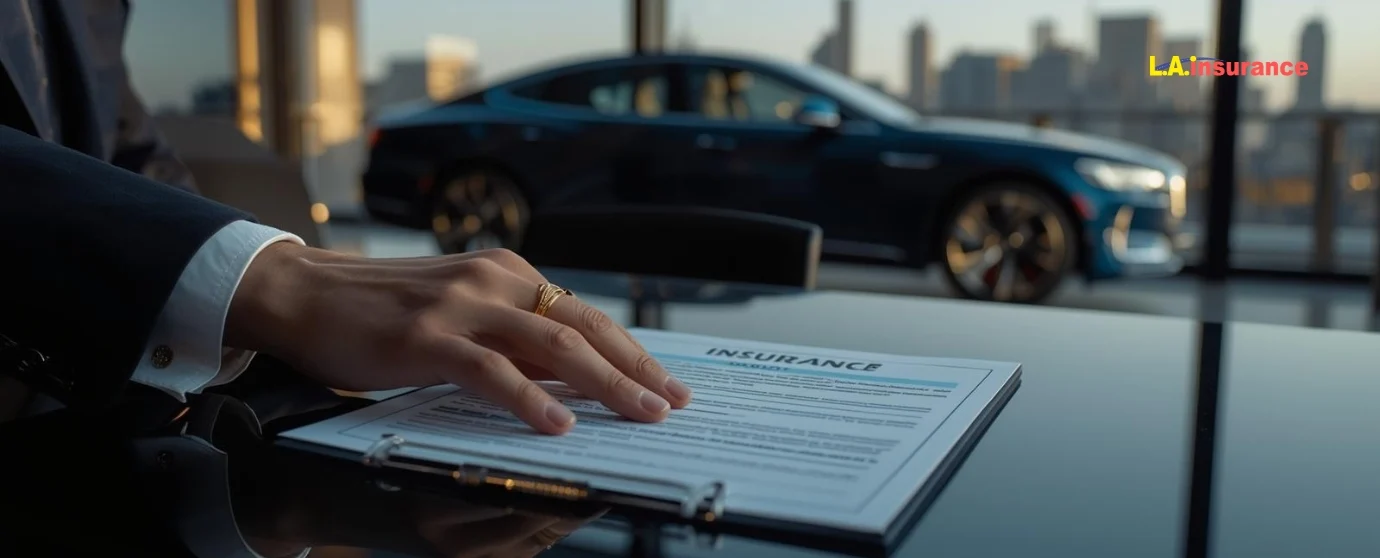
Publish Date: 21-12-2024
Motorcycle Insurance
Last Updated: 18-12-2025
Is Motorcycle Insurance Mandatory?
If you’re wondering whether motorcycle insurance is mandatory, the short answer is yes. Motorcycle insurance is legally mandatory in 49 out of 50 states in the US, which makes Florida the only state where motorcycle insurance still isn’t mandatory.
Apart from Florida, you cannot register a motorcycle under your ownership, nor ride it on the streets legally unless you have motorcycle insurance.
Reasons Why Motorcycle Insurance is Mandatory
The main reason motorcycle insurance is mandatory is to ensure you have at least some form of financial protection against accidental damage like bodily injuries, and property damage.
As motorcycles don’t have protective barriers like cars, you and your passenger are far more susceptible to severe injuries, and even death. Plus, at at-fault accident can cause severe injuries, and vehicle damage to the other driver, and anyone else harmed by the accident.
According to the NSC, there have been 83,000 injuries in 2021, and 82,687 injuries in 2022 due to motorcycle accidents, with fatalities mounting to 6,413 in 2021, and 6,218 in 2022. Based on the numbers, it shows how risky motorcycles are. In fact, motorcycle riders are 24 times more likely to die in traffic crashes compared to car occupants.
As motorcycles have dire accidental consequences, that’s why it is mandatory in almost every state in the US, which also justifies the following reasons.
Quick Tip: It’s wise to consider staying insured with an affordable insurance company offering cheap motorcycle insurance with the best coverage options.
Legal Requirements
You cannot legally own a motorcycle, nor ride it on public roads without having an active motorcycle insurance in 49 states across the US, except Florida. In case, if you’re caught riding a motorcycle without insurance, you will face legal penalties such as.
- License suspension
- Motorcycle impoundment
- Up to $1,000 fine
- Up to 1-year jail time
Every state in the US has a minimum coverage limit, so based on the state that you’re residing in, it is essential for you to get at least the minimum coverage. However, if you can afford coverage higher than the minimum limit, then it’s recommended that you purchase the highest limit within your budget, especially because the minimum coverage may be inadequate in many cases.
Accidental Liability and Financial Protection
When it comes to motorcycle accidents, you’re legally liable to compensate bodily injuries, vehicle damages, and property damages to the other driver, their passengers, pedestrians or any other third party harmed by the accident in which you’re at-fault. Your own passenger is also your legal liability here.
So, what does accidental liability cover? Simply put, it covers the medical bills, vehicle, and property damage repair expenses to anyone who has been harmed by an accident which you’ve caused. Keep in mind that it does not cover your own expenses, just the ones that you’re liable for.
The liability insurance financially safeguards you by covering your at-fault accidents, it also covers court proceedings and other legal costs if you’re sued after the accident.
Minimum Coverage Limit by State
Most states throughout the US legally require minimum liability-only insurance, while there are some states that require uninsured/underinsured motorist (UI/UIM) coverage.
To stay financially protected, and legally complaint, it is essential to ensure that you have at least the minimum coverage for these mandatory types of motorcycle insurance according to your state laws.
Minimum Liability Only Coverage by State
It is a legal requirement to have the minimum liability-only coverage in every state except Florida. The following table shows the minimum liability coverage for motorcycle insurance in each state as of December 2024.
Note: All coverage limits presented here are in thousands. For example, in most US states the minimum liability only coverage is $25,000 for bodily injuries, $50,000 for bodily injuries per accident, and $10,000 for property damage. These figures are commonly presented as 25/50/10.
State | Minimum Liability Required (Bodily Damage Per Person/ Bodily Damage Per Accident/Property Damage) |
Alaska | 50/100/25 |
Alabama | 25/50/25 |
Arkansas | 25/50/25 |
Arizona | 25/50/15 |
California | 15/30/5 |
Colorado | 25/50/15 |
Connecticut | 25/50/25 |
Delaware | 25/50/10 |
Florida | Not Required |
Georgia | 25/50/25 |
Hawaii | 20/40/10 |
Idaho | 25/50/15 |
Illinois | 25/50/20 |
Indiana | 25/50/25 |
Iowa | 20/40/15 |
Kansas | 25/50/25 |
Kentucky | 25/50/25 |
Louisiana | 15/30/25 |
Maine | 50/100/25 |
Maryland | 30/60/15 |
Massachusetts | 20/40/5 |
Michigan | 50/100/10 |
Minnesota | 30/60/10 |
Mississippi | 20/50/25 |
Missouri | 25/50/25 |
Montana | Not Required |
Nebraska | 25/50/25 |
New Hampshire | 25/50/25 |
New Jersey | 15/15/5 |
New Mexico | 25/50/10 |
New York | 25/50/10 |
Nevada | 25/50/20 |
North Carolina | 30/60/25 |
North Dakota | 25/50/25 |
Ohio | 25/50/25 |
Oklahoma | 25/50/25 |
Oregon | 25/50/20 |
Pennsylvania | 15/30/5 |
Rhode Island | 25/50/25 |
South Carolina | 25/50/25 |
South Dakota | 25/50/25 |
Tennessee | 25/50/25 |
Texas | 30/60/25 |
Utah | 25/65/15 |
Vermont | 25/50/10 |
Virginia | 30/60/20 |
Washington | 25/50/10 |
West Virginia | 25/50/25 |
Wisconsin | 25/50/10 |
Wyoming | 25/50/20 |
Read More: Is Motorcycle Insurance Expensive?
Minimum Uninsured/Underinsured Motorist (UI/UIM) Coverage by State
The uninsured/underinsured motorist coverage covers your medical bills, vehicle and property repair expenses when the other driver who is at-fault for the accident is either uninsured, or does not have adequate coverage, and is also unable to pay from out-of-pocket expenses.
According to the Insurance Information Institute, 14% of all registered motorists through the US don’t have any auto/motorcycle insurance or lack sufficient coverage. So, that’s why it is necessary to have UI/UIM motorist coverage.
The UI/UIM motorist coverage is mandatory for motorcyclists in 21 states across the US with a minimum coverage limit as follows.
State | Minimum UI/UIM Coverage (Bodily Damage Per Person, Bodily Damage Per Accident, Property Damage) |
Connecticut | 25/50 |
District of Columbia | 25/50/5 |
Illinois | 25/50 |
Kansas | 25/50 |
Maine | 50/100 |
Maryland | 30/60/15 |
Massachusetts | 20/40 |
Minnesota | 25/50 |
Missouri | 25/50 |
Nebraska | 25/50 |
New Hampshire | 25/50/25 |
New York | 25/50 |
North Carolina | 30/60/25 |
North Dakota | 25/50 |
Oregon | 25/50 |
South Carolina | 25/50/25 |
South Dakota | 25/50 |
Vermont | 50/100/10 |
Virginia | 25/50/20 |
West Virginia | 25/50/25 |
Wyoming | 25/50 |
Exceptions and Special Circumstances When Motorcycle Insurance is Not Required
The main reason motorcycle insurance is mandatory in almost every state in the US is, it’s necessary to ensure you have the financial backup to cover an accident, especially accidental liabilities that you owe to another person. However, there are some cases when it’s not legally required to have motorcycle insurance, such as.
Not Required in Your State
Florida is the only state in the US where motorcycle insurance is not mandatory. So, that means if you’re living in Florida, you’re legally exempted from acquiring motorcycle insurance.
But as an alternative, you must show proof of financial responsibility while registering your motorcycle at the DMV. To show proof of financial responsibility you will have to enlist an asset worth of $40,000 that’s free of debt or any liability, which is also known as declaring a self-insurance certificate.
So, if you’re responsible for an at-fault accident, you will have to surrender the declared asset to the victim. If you think about it, it could lead to a greater financial burden, on that note you always have the option to get minimum liability-only coverage of 25/50/10.
Storing Your Motorcycle During Non-Riding Seasons
It becomes almost impossible to ride a motorcycle during harsh winters, especially when the roads are icy, and are covered in snow with a severe freezing temperature of around 32°F. It’s also very dangerous as icy roads are very slippery which could set the motorcycle to lose its balance leading to deadly crashes.
Moreover, the cold temperature may also make it extremely uncomfortable to ride. So, with all these things under consideration, you can choose to cancel your motorcycle insurance policy temporarily.
Alternatively, you can purchase layup insurance, which will suspend all motorcycle insurance coverage except comprehensive insurance.
You Don’t Ride Your Motorcycle
As long as you’re not riding your motorcycle, whether it’s a personal choice, due to a health condition, or you’re in another state or country, you don’t need the mandatory motorcycle insurance coverage. This is mainly because as long as you’re not riding your motorcycle, you’re neither endangering yourself nor anyone else.
If you’re keeping your motorcycle stored in the garage or in the yard, you may consider optional motorcycle insurance coverage such as comprehensive insurance. Even if it remains parked, there’s always a threat of theft, fire hazard, or severe weather conditions like an earthquake, storm or tsunami.
Read Also: Can You Get Motorcycle Insurance with a Permit?
Benefits of Having Motorcycle Insurance Even When It's Not Mandatory
If you’re living in Florida, where motorcycle insurance is optional, it would still be crucial to get motorcycle insurance. According to Florida’s Department of Transportation, it continues to rank as the top 3 states in the US with the highest number of motorcycle fatalities.
Based on the data provided by Florida Highway Safety, there have been 8,582 motorcycle crashes, which has led to 7,394 injuries and 505 fatalities in Florida as of 7th December 2024.
So, if you’re a motorcyclist in Florida, you should highly prioritize having motorcycle insurance, especially as the number of motorcycle accidents are so high. On the other hand, regardless of the frequency of accidents in a particular area, or whether its mandatory, having motorcycle insurance has some necessary benefits.
- Provides Financial Protection
- Reliable Coverage for Medical Bills, Theft, Damages, and Legal Proceedings
- Accountability for Accidental Liabilities
- Peace of Mind
Read Also: Does Motorcycle Insurance Cover Theft?
Final Tip: Stay Legally and Financially Secured by Being Insured
As motorcycle insurance is mandatory in 49 out 50 states in the US, except Florida. But even in Florida, you will have to provide proof of financial responsibility by reserving an asset worth $40,000, in some ways it is equivalent to staying insured.
Either way, you’re legally required to have some type of motorcycle insurance policy. So, to stay legally complaint, and to ensure your own financial safety it is wise to stay insured.
While you get to spend the least by acquiring minimum motorcycle insurance, it’s worth investing in higher premiums to get the best coverage in your budget.
If you need help to determine whether minimum motorcycle insurance is adequate for you, or if it’s possible to get better coverage within a certain budget, you should consult with a local insurance agent. Or you can contact us to get a free quote.
FAQ
Is motorcycle insurance mandatory in the USA?
Yes, motorcycle insurance is mandatory in every US state except Florida.
Can you ride without motorcycle insurance?
No, it is illegal to ride a motorcycle without proof of insurance, and in Florida, you need to show proof of financial responsibility while registering your motorcycle.
Which states do not require motorcycle insurance?
Florida is the only state in the US that does not require motorcycle insurance. But you need to get proof of financial responsibility such as a self-insurance certificate or a surety bond in Florida.
Editorial Disclaimer
The information provided on this blog is for general informational purposes only and does not constitute professional insurance, legal, or financial advice. Coverage and rates are subject to individual eligibility, underwriting guidelines, and state availability. For specific questions regarding your policy or to get an accurate quote, please contact a licensed L.A. Insurance agent directly. We're an independent agency and not a direct insurance carrier. For more information on how we operate and handle your data, please see our Terms and Conditions and Privacy Policy.
Tag :
motorcycle insurance
Motorcycle








